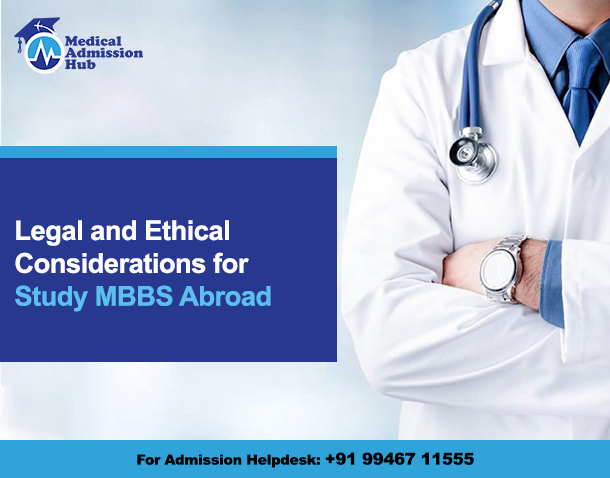- Posted On: August 28, 2024
- Posted By: mahadmin
Legal and Ethical Considerations for Study MBBS Abroad
Study MBBS abroad is an exciting venture into the world of medical professional experiences on an international platform. It would serve as a great opportunity for broadening horizons in clinical experience and insight into cultures that might help in developing a career path in MBBS abroad for Indian students. However, it’s a journey literally filled with comprehensive agility through a legal and ethical minefield. Everything from the legitimacy of the medical institution to understanding visa regulations, from ethical recruitment practices to cultural norms contributes a great deal to building up a rewarding educational experience. These are just some of the variables that have been discussed in order to give a general overview of how one can go about making the right decision, and thereby get effectively prepared for international medical studies.
Some of the rules that can be considered are:
1. Understanding Local Laws and Regulations
First of all, the legal framework is to be taken into consideration when choosing to study MBBS abroad. Every country has separate rules regarding rules related to admission, visa requirements, and residency obligations for foreign students. Knowing these is very necessary for MBBS abroad for Indian students to avoid any complications in terms of legality. They should also be aware of the rules for post-work opportunities in some countries that have strict rules associated with practicing medicine after the degree is completed.
2. Accreditation and Recognition
While selecting an MBBS abroad, it is also very important to ensure that the respective medical college is accredited and recognized by the relevant authorities of the host country and India. It should be validated through the Medical Council of India, as is the requirement for practicing in India National Medical Commission. Further failure to pursue a course from such a recognized institution would amount to not being able to practice in India, which will be a great setback for any medical graduate.
3. Ethical Considerations in Medical Practice
The ethical considerations are immense for medical education and practice, becoming increasingly complex in a foreign country. In this country, students must know the host country’s regulations, different from those of India. Such issues could include the way of getting patient consent, confidentiality, and even end-of-life care, considered differently among cultures. MBBS abroad for Indian students thus needs to be prepared for such varied changes and yet retain the intrinsic core in medical ethics.
4. Cultural Sensitivity and Patient Interaction
Studying in a foreign country always involves treating patients from different cultural backgrounds. Indian students have to be culturally sensitive to communicate and empathize with the patients effectively. This is ethically important, but also the quality of care increases with more understanding of the norms and values in a culture. Being culturally sensitive will also help the student to avoid misunderstandings and conflicts in clinical settings.
5. Legal Obligations Post-Graduation
Following the completion of an MBBS in a foreign country, an Indian student has to go through the legal formalities before practicing medicine either in the host country or back home in India. Once back home, they have to take either the Foreign Medical Graduate Examination (FMGE) or the National Exit Test (NExT) for licensure. Also, the students need to be aware of the fact that Indian authorities would insist upon mandatory internships or residence programs for hands-on experience as well as proper legal recognition as a medical practitioner.
6. Financial and Contractual Obligations
In all cases to study abroad, Indian students should be cautious to make sure that what is agreed upon with the universities, host country, and education consultants includes scholarships, loans, and contract obligations. In other words, one should not suffer from undue financial strain. Moreover, they should be wise enough to know if there are legal obligations that can affect one’s study abroad, such as visa conditions generously linked with academic performance or the degree completion process.
Conclusion
MBBS abroad for Indian students could only mean gaining exposure to levels of varied medical practices and their respective cultures. However, the student must be informed about the legal and ethical considerations about the same. Proper research regarding the laws of the host country, ensuring the accreditation of the host institution, understanding ethical guidelines, and meeting all the legal obligations would enable students to reap all the benefits of MBBS in foreign countries to make a successful career in medicine.
Whether it be studying MBBS abroad from Medical Admission Hub, the Best MBBS abroad consultants for exposure, or advanced medical training, being sensible about these in the back of your mind will surely help you navigate your journey with confidence and integrity.


